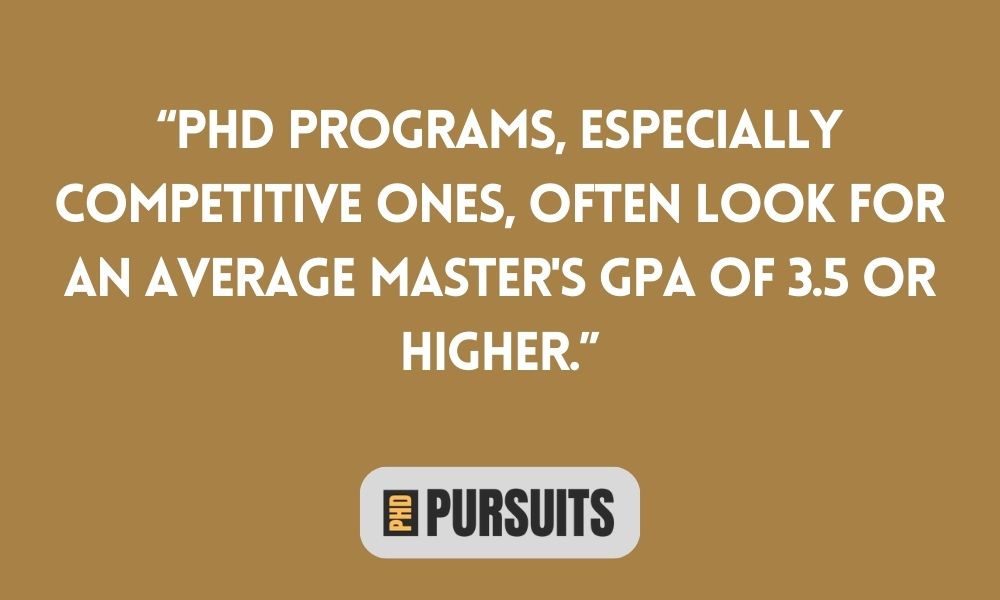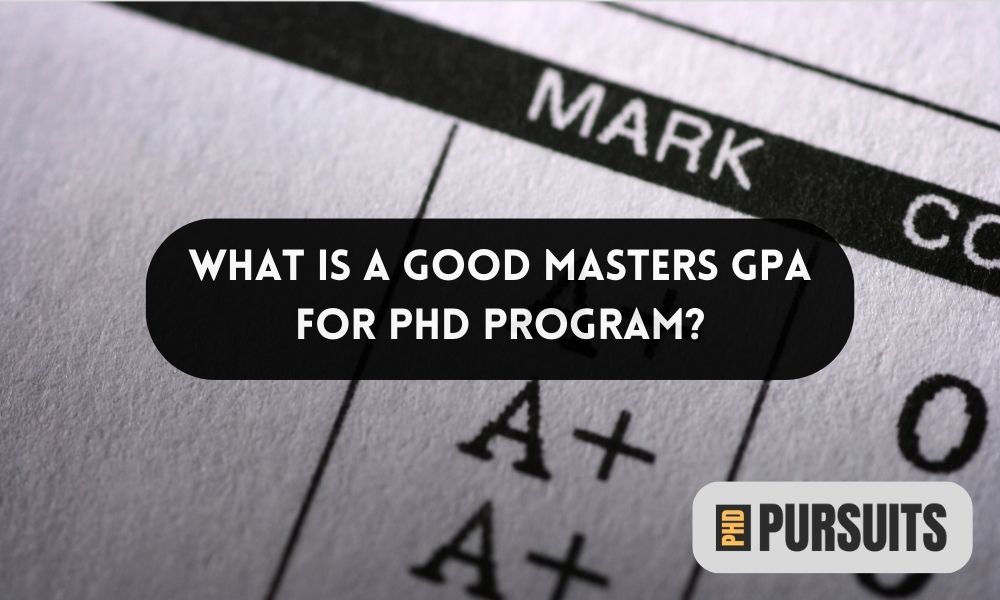If your masters GPA is not good, you may think that your plans to go for a PhD is over. Or, is it? What is a good masters GPA for PhD program?
PhD programs, especially competitive ones, often look for an average master’s GPA of 3.5 or higher. This is considered a good GPA in grad school and can significantly impact your admission prospects. However, there are ways to get into a PhD program, even if you have a low GPA score.
This post explores the required GPA score to get into a PhD program, and also other important factors that could influence your application.
What Is A Good Masters GPA For PhD?
When you’re aiming for a PhD, your master’s GPA plays a crucial role. A strong master’s GPA not only sets you apart but also reflects your academic commitment.
PhD programs, especially competitive ones, often look for an average master’s GPA of 3.5 or higher. This is considered a good GPA in grad school and can significantly impact your admission prospects.

Your GPA in graduate school showcases your ability to handle advanced coursework, a key indicator for PhD programs. It’s important to understand that PhD admissions committees don’t just look at numbers. They consider your entire profile, including:
- research experience,
- GRE scores, and
- your statement of purpose.
However, the significance of GPA can differ depending on your field of study. PhD programs in education might weigh practical teaching experience more heavily than a program focused on theoretical research.
If you’re applying to a PhD program with a lower GPA, highlighting your research experience or a strong statement of purpose can offset a poor undergrad GPA.
Remember, while a high GPA is advantageous, a lower graduate GPA doesn’t automatically disqualify you. Many programs require a minimum GPA of 3.0, but if yours is slightly below, compensate with strong research credentials or recommendations from professors at the same school.
Each program you are applying to may have different expectations. Some doctoral degree programs have a high minimum GPA requirement, while others may be more flexible.
Make sure you research the specific requirements of the programs you’re interested in.
Factors Influencing Your GPA In Grad School
Navigating grad school is a unique journey where your GPA becomes a reflection of more than just test scores. It’s influenced by a tapestry of factors, each playing its part in the academic saga.
- Course Selection: Opting for a mix that balances your strengths with necessary challenges can help maintain a strong GPA. Remember, a well-chosen elective can boost your GPA just as a core course can test it.
- Time Management: Grad school is demanding, with research, internships, and coursework all clamoring for your attention. Effective time management can mean the difference between a good GPA and a great one.
- Your Professors: Their roles can’t be understated. Building a rapport with them can provide insights and guidance not just for coursework, but for navigating the academic landscape of your field. Their support can be invaluable, especially when you’re pursuing a PhD.
- Your academic background: A solid foundation from your undergrad days sets the stage, but gaps in knowledge can be challenging. It’s not just about a high undergrad GPA but understanding the core concepts that will be built upon.
- Culture And Expectations Of Your Specific Program: influence your GPA. Some programs have a reputation for grade inflation, while others are known for their rigor. Understanding these nuances can help you set realistic goals and strategies for success.
In grad school, your GPA is a tapestry woven from these varied threads. It’s not just a number but a narrative of your academic journey, unique to each student.
Do Masters GPA Matter A Lot To PhD Admission Committees?
Your master’s GPA is more than just a number; it’s a key that can unlock the door to your desired PhD program. Here’s why admissions committees weigh it heavily.
Reflects Your Academic Abilities
Your GPA reflects your academic abilities in a graduate-level setting. It’s one thing to excel in undergrad courses, but grad school demands a higher level of understanding and critical thinking.
A strong master’s GPA suggests you’re up for the challenge of a PhD program. Masters level study usually are closer to PhD than undergraduate, which means the earlier to reflect your potential performance in PhD better.
Showcases Your Consistency and Dedication
A high GPA in grad school showcases your consistency and dedication. PhD programs are rigorous and require sustained effort – more like a marathon than a sprint.
If you’ve maintained a high GPA throughout your master’s, it signals to the admissions committee that you have the work ethic and stamina needed for the long haul of a doctoral program.
Potential In Research
Your GPA can be a proxy for your potential in research. Many PhD programs involve extensive research, and a good masters GPA indicates you’ve successfully done some research, and navigated this aspect.

It’s not just about grades; it’s about demonstrating your ability to contribute to your field of study. If you can do so well at masters’ level, you should be able to perform at a higher level during your PhD studies.
Helps To Differentiate Candidates
Grad school GPAs help differentiate candidates in competitive fields. When many applicants have strong GRE scores and research experience, a high master’s GPA can set you apart. It becomes a critical factor in deciding who gets the limited spots.
In cases where undergrad performance is less than stellar, a strong master’s GPA can turn the tide. It shows growth and the ability to overcome past academic hurdles.
Admissions committees recognize this resilience, often viewing a strong graduate GPA as evidence of a candidate’s true potential, despite a lower undergrad GPA.
Aside From Good GPA, What Else Is Important For Graduate School?
When applying to a PhD program, there’s more to the process than meets the eye. While a good GPA can open doors, it’s not the sole factor admissions committees weigh.
Beyond the numbers, your application tells a story, and here are some other factors that matter just as much when you apply for PhD:
Research experience
Research experience stands out as a critical element. For graduate programs, especially those in academia, the ability to conduct research is paramount.
This isn’t just about assisting in a lab or completing a project; it’s about demonstrating a genuine contribution to your field of study.
If you have:
- published papers,
- presented at conferences, or
- worked as research assistants
these experiences can significantly offset a lower GPA by showing your potential as a researcher.
Statement Of Purpose
Your statement of purpose is another game-changer. This isn’t merely an essay; it’s your voice in the admissions process. A compelling statement can set you apart by weaving your:
- past experiences,
- future goals, and
- the reasons for choosing the specific program into a coherent narrative.
Admissions committees look for candidates who not only fit academically but also align with the program’s research focus and culture.
Letters of recommendation
This can carry considerable weight. Unlike a GPA, which reflects your academic abilities broadly, recommendations provide a nuanced view of:
- your character,
- work ethic, and
- potential as a PhD student.
Choose recommenders who know you well and can speak to your abilities in a detailed, personalized manner. Often, a glowing recommendation from a respected professor can make up for a less-than-ideal GPA.

Work & Research Experience
Relevant work or professional experience can also play a vital role, especially for programs that value practical skills alongside academic prowess.
This is particularly true in fields where industry experience can inform and enhance research work.
Such experience not only demonstrates your ability to apply knowledge in real-world settings but also indicates maturity and time management skills.
An Upward Academic Trajectory
Your overall academic trajectory can impact your application. A rising trend in your grades through your undergrad or a strong master’s GPA can demonstrate growth and the ability to overcome challenges.
Programs may require a minimum GPA, but a demonstrated improvement over time or excellence in your specific field of study can speak volumes about your readiness for doctoral-level work.
How Do I Get Into A PhD Program With A Low GPA?
Getting into a PhD program with a low GPA might seem daunting, but it’s not impossible. Graduate programs understand that a GPA is just one aspect of your academic profile. If your masters GPA falls short, focusing on other areas can significantly offset this.
Research experience is gold in academia, especially for PhD admissions. Dive into projects, publish your findings, and work closely with professors.
This hands-on experience in your field of study can set you apart and demonstrate your commitment and potential as a PhD student. Programs are interested in what you can bring to the table now, not just your past.
The GRE can be another opportunity to shine. A high score can help balance a lower GPA, showing that you have the critical thinking and analytical skills needed for rigorous academic work.
Don’t overlook the power of a compelling statement of purpose. This is your chance to tell your story, highlighting how your experiences, even the challenges, have prepared you for pursuing a PhD. Explain your:
- research interests,
- your professional goals, and
- why the program you are applying to is the perfect fit for you.
Lastly, building a rapport with potential advisors can make a huge difference. If a faculty member is interested in your research proposal and advocates for you, it can significantly impact the admissions committee’s decision.

Remember, PhD programs care about your potential as a researcher and scholar in your desired field, not just your masters GPA.
Understanding The PhD Requirements – Not Just Good Average GPA
A good master’s GPA for a PhD program typically ranges from 3.5 to 4.0, reflecting strong academic performance and readiness for advanced study.
However, it’s important to consider other factors such as research experience, publications, and a well-articulated statement of purpose.
Programs value a holistic view of candidates, so if you have lower GPA, mitigated it by highlighting your strengths in other areas. Always align your application to the specific requirements and values of your desired PhD program for your best chance of success.

Dr. JW Ong holds academic degrees, including a Ph.D. in Applied Linguistics from universities in New Zealand, Malaysia, and the UK. He started PhDPursuits.com as a way to share the experience he wish he would have had known before embarking on his PhD.

